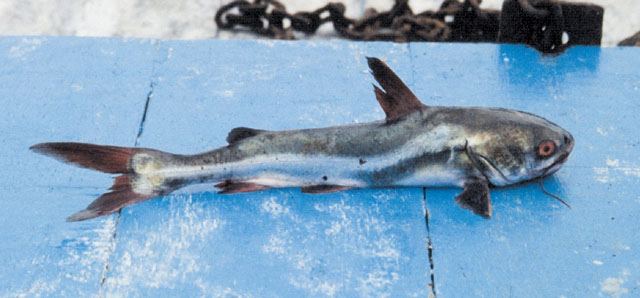| Ariidae (Sea catfishes), subfamily: Galeichthyinae |
| 35 cm TL (male/unsexed) |
|
demersal; marine |
| Southeastern Pacific: Peru. |
|
This species is distinguished by the following characters: slender head and body, with body posteriorly well tapered; pointed caudal fin lobes, upper lobe longer; long and narrow caudal peduncle; lateral body with silvery to reddish stripe; tooth patches posterior to premaxillary tooth band slightly separated at midline; Anterior gillrakers on first arch 13-15; external skull with shallow, narrow dorsomedian groove, extending from interorbital area to base of supraoccipital; cranial fontanelles (of exposed skull) set within steeply-welled median cranial depression, or fissure, with nearly parallel sides; rugose skull, striate and tuberculate in part; swimbladder angularly heart-shaped and anterior margins more triangular than rounded, longitudinal septum of posterior chamber of swimbladder traversed by one smaller septum; aortic canal on ventral side of Weberian apparatus uncovered by lamellae (no aortic tunnel formed); Müllerian ramus of fourth vertebra with irregularly textured, ovoid, concave facet on ventral side; posterior (humeral) process of the cleithrum broad and blade-like (Ref. 85159). |
| Found in coastal waters (Ref. 9271). Marketed fresh and also reduced to fishmeal (Ref. 9271). |
|
Least Concern (LC); Date assessed: 21 May 2007 Ref. (130435)
|
| traumatogenic |
Source and more info: www.fishbase.org. For personal, classroom, and other internal use only. Not for publication.
